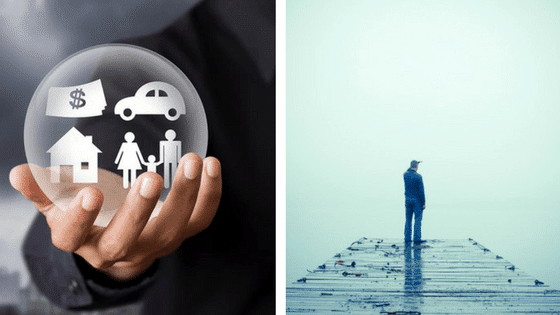
How to deal with the uncertainties of life
Life is what happens while we are making other plans
The plans we make
Many of us grew up with some version of how our lives might unfold—versions passed down to us from our parents, and adjusted according to the influences we encountered while growing up. I remember deciding quite early on that I was going to live in an isolated village community at the top of a mountain far from civilisation. My plan was to live only with people that I loved and I certainly intended to have a big family. By the time I was eighteen I was at university in Leeds and on my way to becoming a teacher in London—no mountain top in sight! A few years later I found out that I was not able to have children and no amount of treatment seemed able to turn that around.
The uncertainty of life
We all want to be happy and live a good life. We may well have lots of ideas as to how we want to make this happen but we can see that life is quite fragile and uncertain. Circumstances change, things happen beyond our control and we never know what the next day will bring. We never have enough information to make the decisions that affect our lives—how will the person you promise to love and cherish from today onwards be in twenty years’ time? Will you still like them? We can hope but we cannot be sure.
Our frailty
Then our bodies can let us down at a moment’s notice. The news is full of accidents that befall people going about their ordinary everyday lives—then there are the extraordinary events of terrorist attacks and travel catastrophes. On top of that, there are numerous illnesses and complaints that can invade our bodies and, inevitably, there is the slow but steady onset of ageing.
The insecurities of work
Perhaps we set out in life to be successful at work. In our meritocratic society, we are told from an early age that, with hard work, we can become whatever we want. The problem is that life shows us something different. However much we study and train there are circumstances beyond our control that will affect the result we are looking for. We might have an unsupportive boss; the economy might go into recession; or we may have to move house to be near an ailing parent. We watch in amazement the people who appear to have discovered how to make the system work for them and seem to have endless resources and opportunities.
We can wonder if we can become anything we want what is wrong with us when we are not at the top of our game. If rewards go to the people who deserve them, then are we undeserving?
Happiness and success
We can see that although we may wish for happiness, it is not as easy to bring about as we hoped and unhappiness comes much more often than we want. Perhaps our relationship is in trouble, maybe we cannot afford the holiday we were looking forward to, or we feel lonely even when with our friends. None of this fits with the images of success that fill advertising campaigns, which tend to focus on happy, fit and glamorous people. Social media can help to create an idea that everyone is having more fun than we are in all areas of life—work, leisure, family life, wellbeing and so on. It is a small step from feeling that others are doing better than ourselves to equating their happiness with success and any of our own unhappiness with failure.
How do we respond?
Fear of vulnerability
All of this can leave us feeling vulnerable, which does not need to be a problem except if we see it as a weakness. Many of us feel that if we are vulnerable, then other people will look down on us, or even take advantage of us. My mother used to warn me not to let other people see when I was upset and struggling to cope. She told me that it was a way of ‘letting myself down’. Her advice left me with a sense that being vulnerable diminished me, and made me less effective.
Happiness = success
If we feel vulnerable and are trying to cover it up, then we are easily going to tip over into trying very hard to appear as in control as we possibly can. You are probably familiar with the line of thinking—if I can hold it together, not show my feelings and get things right, then people are going to like me and approve of me. Because we are equating happiness with success, then we want to emulate what is seems to mean to be happy. We push down any feelings of vulnerability and insecurity and strive for an idea of perfection which we think will guarantee us acceptance.
Our critical voice
All of this is taking place with a tremendous amount of effort. We will ourselves to accomplish what we feel we must accomplish to hold our place in our community. We are not sharing our struggle with anyone else, so there is no-one to turn to for advice. This vacuum is filled with our own critical voice urging us to try harder and finding fault every step of the way. It is as if we believe that it is only by beating ourselves up that we will get the best from ourselves. If we let up the continuous critical commentary, we will not be able to trust ourselves to stay focused and accomplish what we feel we have to do.
Does this work?
After I left teaching I was appointed to a small executive team managing a large multi-national non-profit. I loved the work but it was incredibly challenging, with a steep learning curve. For the first time in my career I was one of the people in charge and the demands of the role pushed me back into insecurities that I thought had been overcome. It was not clear to me how much of cover up I was trying to pull off until there was a meeting with the directors of each of our national groups. The executive team was trying to get agreement on a key issue that I had put a lot of work into. The meeting quickly got stuck and it looked as if the project was going to fail. Out of a desperate attempt to save the project, I dropped my guard and spoke from the heart about how important it was.
Imagine my amazement when after the meeting—and its successful outcome—several people approached me to say how much it had meant to them to see me showing some vulnerability. It seems that till that point colleagues had been finding me tough and uncompromising, when I knew how challenged and insecure I felt. My inability to share any of my vulnerability and my attempts to appear in control had led people to feel less at ease with me and to not fully trust my directions.
Allowing ourselves to be vulnerable, fallible and imperfect
Vulnerable
We may be afraid that allowing ourselves to be vulnerable will make us appear weak, when in fact, the opposite is true. When we are vulnerable we are not pretending, we are not hiding—we are simply present with whatever is going on inside us. We can relax. This gives a kind of confidence that we can manage whatever is going on. There is also a generosity, because we are allowing others to know what is going on with us and are indicating a willingness to receive help and support from them as we go through it. Such openness is flexible and responsive, rather than brittle and afraid.
Fallible
Engaging with self-compassion is a way of discovering a sense of acceptance of ourselves. We take on engaging with ourselves as we would with a good friend. We treat ourselves with kindness rather than harsh criticism, which helps us to work with our difficulties in a more sustainable way. Connecting with our own fallibility reminds us that everyone struggles at some time or other. At any time we may be feeling bad about something in our lives it is a fairly good bet that many other people are going through something very similar. We are all in the same boat regarding the uncertainties of life.
Imperfect
Have you ever met anyone that you consider perfect? It’s not common, is it? Why then do we think that is a realistic goal for ourselves? My meeting story shows that by trying to be perfect, we face the possibility of being less effective than we want to be. On the other hand, learning to accept ourselves as we are, with all our insecurities, fears and worries can be a deep source of wellbeing. When we can feel comfortable with all aspects of ourselves—the parts we like as well as the parts that we would like to be different—then we have the raw materials of coping with what life brings. With these raw materials the uncertainties of life become more the inevitable flow of life to be worked with, rather than fears and challenges to be battled against.
If you would like to take the ideas in this post further check out my online course How to be a Good Friend to Yourself
You can find out more here

